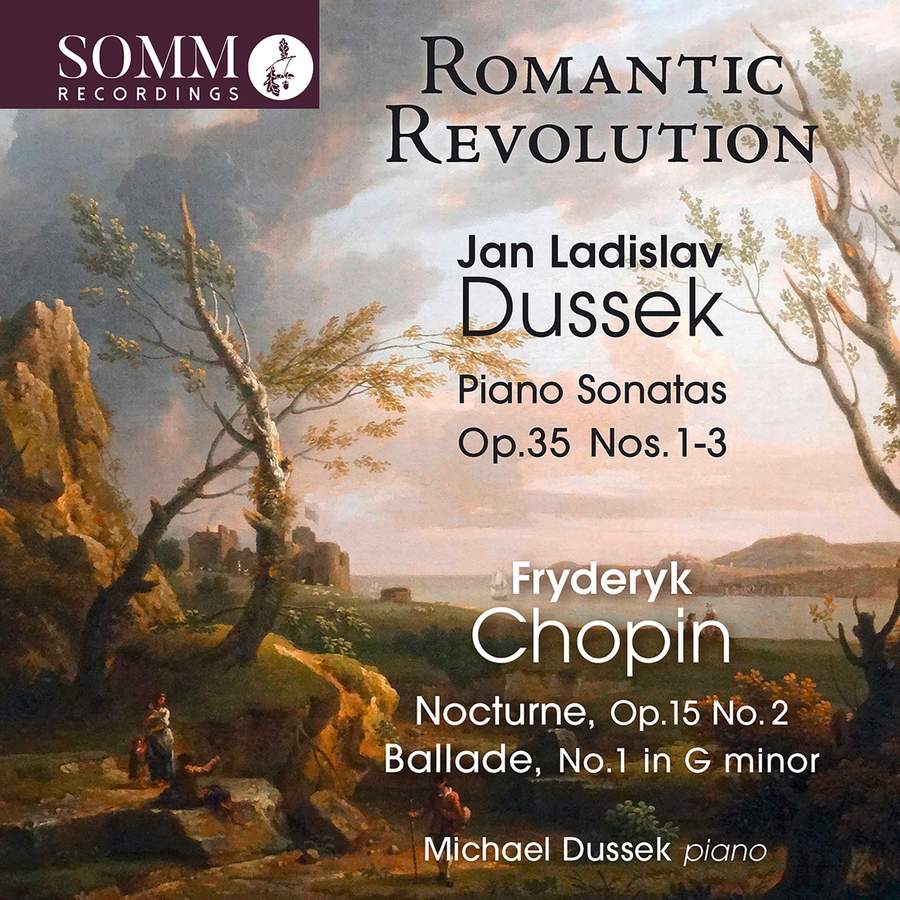Michael Dussek: Romantic Revolution
View record and artist detailsRecord and Artist Details
Genre:
Instrumental
Label: Somm Recordings
Magazine Review Date: 07/2021
Media Format: CD or Download
Media Runtime: 64
Mastering:
DDD
Catalogue Number: SOMMCD0634

Tracks:
| Composition | Artist Credit |
|---|---|
| (3) Sonatas for Piano |
Jan Ladislav Dussek, Composer
Michael Dussek, Piano |
| (3) Nocturnes, Movement: f sharp minor |
Fryderyk Chopin, Composer
Michael Dussek, Piano |
| (4) Ballades, Movement: No. 1 in G minor, Op. 23 |
Fryderyk Chopin, Composer
Michael Dussek, Piano |
Author: David Threasher
Michael Dussek can’t be sure whether he’s descended from the 18th-/19th-century Bohemian composer Jan Ladislav Dussek (1760-1812). Nevertheless, the nominative coincidence inspires this labour of love, a recording of the three sonatas of his putative forebear’s Op 35 – three piano sonatas composed during 1797, while the much-travelled composer was resident in London.
Dussek (M) traces the development of the keyboard style of Dussek (JL), identifying in particular his advocacy of legato and notable use of the sustain pedal – indeed, he was possibly the first composer to include pedal indications in his piano scores. In fact only the third of these sonatas contains a singing Adagio, the others being two-movement affairs, albeit in no way lightweight in comparison. If this sole slow movement becomes the still centre of the agitated C minor work, there is lyricism elsewhere alongside a questing approach to harmony, with enharmonic shifts that in some cases prefigure Schubert. One occasionally hears the shadow of Haydn – not least in Dussek’s ability to build movements of cumulative power from material that may initially seem unpromising – as well as Beethoven, whose Op 10 sonatas are roughly contemporary.
Michael Dussek makes the case that Chopin, having rejected Beethoven and Schubert, looked to Jan Ladislav as an early model. The two share a songful approach to melody and firm contrapuntal underpinnings, as well as pianistic ease and virtuosity, as Dussek demonstrates in the inclusion of a Nocturne and a Ballade to close the programme. It goes without saying that where Chopin scores over his predecessor is in his unerring gift for instant melodic memorability and his ability to encapsulate the most profound expression in movements of complete perfection without a single wasted note. But then, most composers for the piano would come off second best to Chopin! Dussek’s playing of his namesake’s sonatas is occasionally slightly literal at the expense of the last touch of expressivity but the two Chopin works show a greater range of touch and eloquence. Nevertheless, the core of the project is a fascinating exploration of music that is eminently worth a second hearing.
Discover the world's largest classical music catalogue with Presto Music.

Gramophone Digital Club
- Digital Edition
- Digital Archive
- Reviews Database
- Full website access
From £8.75 / month
Subscribe
Gramophone Full Club
- Print Edition
- Digital Edition
- Digital Archive
- Reviews Database
- Full website access
From £11.00 / month
Subscribe
If you are a library, university or other organisation that would be interested in an institutional subscription to Gramophone please click here for further information.





